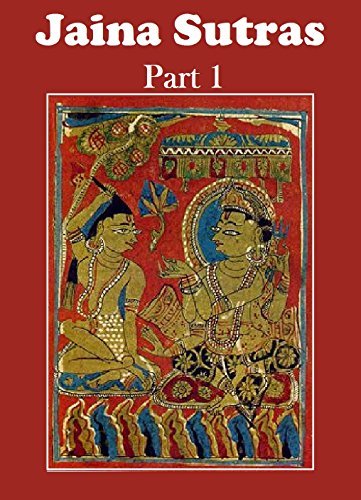Acaranga-sutra
by Hermann Jacobi | 1884 | 71,211 words | ISBN-10: 8120801237 | ISBN-13: 9788120801233
The English translation of the Acaranga Sutra, which represents the first the 12 Angas in Shevatambara Jainism. It is traditionally dated to the 5th-century BCE and consists of two parts containing lectures based on the teachings of Mahavira. Topics include: lifestyle of an ascetic: conduct, behavior, collecting alms, clothes, mode of walking and ...
Lecture 6, Lesson 1
[Sixth lecture (uddesaya, uddeśaka): Begging for a bowl (pāesaṇā)]
A monk or a nun wanting to get a bowl, may beg for one made of bottle-gourd or wood or clay, or such-like bowls. If he be a youthful, young, &c. (see II, 5, 1, § 1) monk, he may carry with him one bowl, not two[1].
A monk or a nun should not resolve to go farther than half a Yojana to get a bowl.
As regards the acceptance of a bowl, those four precepts which have been given in (the First Lesson of the First Lecture, called)[2] Begging of Food, concerning one fellow-ascetic, &c., should be repeated here, the fifth is that concerning many Śramaṇas and Brāhmaṇas.
A monk or a nun should not accept a bowl which the layman has, for the mendicant’s sake, bought, &c. (see the Lecture called Begging of Clothes[3]). (I )
A monk or a nun should not accept any very expensive bowls of the following description: bowls made of iron, tin, lead, silver, gold, brass, a mixture of gold, silver, and copper, pearl, glass, mother of pearl, horn, ivory, cloth, stone, or leather; for such very expensive bowls are impure and unacceptable. (2)
A monk or a nun should not accept bowls which contain a band of the same precious materials specialised in § 2; for &c. (3)
For the avoidance of these occasions to sin there are four rules for begging a bowl to be known by the mendicants.
Now this is the first rule:
A monk or a nun may beg for a bowl specifying its quality, viz. bottle-gourd or wood or clay. If they beg for such a bowl, or the householder gives it, they may accept it, for it is pure and acceptable.
This is the first rule. (4)
Now follows the second rule:
A monk or a nun may ask for a bowl, which they have well inspected, from the householder or his wife, &c. After consideration, they should say: ‘O long-lived one! (or, O sister!) please give me one of these bowls, viz. one made of bottle-gourds or wood or clay.’ If they beg for such a bowl, or the householder gives it, they may accept it; for &c.
This is the second rule. (5)
Now follows the third rule:
A monk or a nun may beg for a bowl which has been used by the former owner or by many people. If they beg for it, &c. (see § 5).
This is the third rule. (6)
Now follows the fourth rule:
A monk or a nun may beg for a left-off bowl which no other Śramaṇa or Brāhmaṇa, guest, pauper, or beggar wants. If they beg for it, &c. (see § 5).
This is the fourth rule.
A monk or a nun having adopted one of these four rules should not say, &c. (see II, 1, t r, § 12, all down to) we respect each other accordingly. (7)
A householder may perhaps say to a mendicant begging in the prescribed way: ‘O long-lived Śramaṇa! return after a month,’ &c. (all as in the Lecture called Begging of Clothes[4]). (8)
The householder may say (to one of his people): ‘O long-lived one! (or, O sister!) fetch that bowl, rub it with oil, ghee, fresh butter or marrow, we shall give it,’ &c. (see II, 5, 1, § 11); or wash, wipe, or rub it with perfumes,‘ &c.; or ’wash it with cold or hot water;‘ or ’empty it of the bulbs,' &c. (see II, 5, 1, §§ 11 and 12). (9)
The householder may say (to the mendicant): ‘O long-lived Śramaṇa! stay a while till they have cooked or prepared our food, &c., then we shall give you, O long-lived one! your alms-bowl filled with food or drink; it is not good, not meet that a mendicant should get an empty alms-bowl.’ After consideration, the mendicant should answer: ‘O long-lived one! (or, O sister!) it is indeed not meet for me to eat or drink food &c. which is ādhākarmika; do not cook or prepare it; if you want to give me anything, give it as it is.’ After these words the householder might offer him the alms-bowl filled with food or drink which had been cooked or prepared: he should not accept such an alms-bowl, for it is impure and unacceptable. (10)
Perhaps the householder will bring and give the mendicant an alms-bowl; the mendicant should then, after consideration, say: ‘O long-lived one! (or, O sister!) I shall in your presence closely inspect the interior of the bowl.’
The Kevalin says: This is the reason: In the alms-bowl there might be living beings or seeds or grass. Hence it has been said to the mendicant, &c., that he should closely inspect the interior of the alms-bowl. (11)
All that has been said in the Lecture called Begging of Clothes (II, 5, I, § 15 down to the end) is mutatis mutandis to be repeated here. (In § 15, add before perfumes) with oil, ghee, butter or marrow.
This is the whole duty, &c.
Thus I say. (12)
Footnotes and references:
[1]:
This applies, according to the commentator, to Jinakalpikas, &c. Ordinary monks may have a drinking vessel besides the alms-bowl.
[2]:
See II, 1, 1, § 11.
[3]:
II, 5, 1, § 3.
[4]:
II, 5, 1, § 10.
